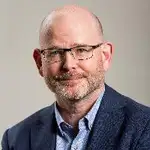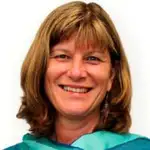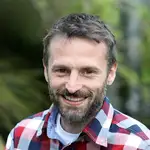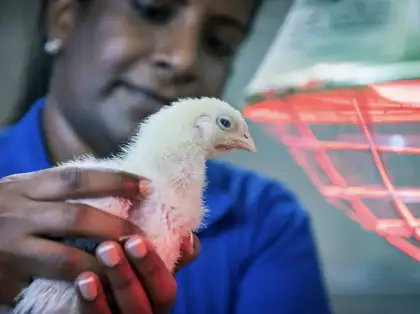Experts from Massey University's School of Veterinary Science are working in partnership with universities around the world, as well as international partners like the United Nations Food and Agriculture Organisation, World Health Organisation, UN Environment Programme and the World Organisation for Animal Health (WOAH), under the One Health umbrella.
One Health is an integrated, unifying approach that aims to sustainably balance and optimise the health of people, animals, and ecosystems. It recognises the health of humans, domestic and wild animals, plants, and the wider environment are closely linked and interdependent.
We investigate how diseases emerge, effect and pass between humans and animals, as well as antimicrobial use and resistance in different countries.
One Health contributes to the Sustainable Development Goals (SDG), in particular, Zero hunger (SDG 2), Good health and well-being (SDG 3), Clean water and sanitation (SDG 6), Responsible consumption and production (SDG 12), Climate action (SDG 13), Life below water (SDG 14), Life on land (SDG 15), and Partnerships for the goals (SDG 17). SDG 17 is particularly relevant because it acknowledges the interconnectedness of health issues and the need for a healthy, sustainably managed environment and a holistic, collaborative approach to addressing them.
Current global One Health programmes
Global One Health Research Partnership (GOHRP)
Massey University has been partnering with Wageningen University & Research (WUR), University of California Davis (UCD) and Nanjing Agricultural University (NAU) in the GOHRP since early 2018.
The major focus of the GOHRP is to work together in an innovative global inter- and trans-disciplinary research programme to address complex multi-species health issues from a global One Health perspective. The initial focus is on understanding the interaction of factors associated with humans, animals and the environment that contribute to the rapid emergence of antimicrobial resistance.
Global Health Agenda Consortium (GHSAC)
Massey University is a member of the Global Health Security Agenda Consortium (GHSAC). This is a voluntary and open collective of nongovernmental entities that are dedicated to promoting values of collaboration, excellence, innovation, and commitment in implementing the Global Health Security Agenda.
The GHSAC also promotes adherence to the International Health Regulations (IHRs), World Organization for Animal Health (WOAH), Performance of Veterinary Services (PVS) Pathways, Alliance for Country Assessments for Global Health Security and IHR Implementation, Biological Weapons Convention and United Nations Security Council Resolution 1540.
World Organisation for Animal Health (WOAH) Collaborating Centre
Massey University’s EpiCentre and mEpiLab team are a WOAH Veterinary Epidemiology and Public Health Collaborating Centre, together with the China Centre for Animal Health and Epidemiology.
China Centre for Animal Health and Epidemiology
List of World Organisation for Animal Health (WOAH) Collaborating Centres
Our people

Distinguished Professor Nigel French
Nigel is a Distinguished Professor of Infectious Disease Epidemiology and Public Health, Emeritus Director NZ Food Safety Science and Research Centre, and Te Niwha (Infectious Diseases Research Platform) Chief Science Advisor.
He is Expert Advisor on AMR for Mott MacDonald (UK Fleming Fund), Co-Founder Director of One Health Aotearoa and Executive Director of the Infectious Disease Research Centre.

Dr Joanna McKenzie
Dr McKenzie is the lead One Health consultant for Mott MacDonald on the Fleming Fund programme to strengthen One Health surveillance for antimicrobial resistance and antimicrobial use in Asian and African countries. She is a member of the Global One Health Research Partnership focusing on One Health aspects of antimicrobial resistance.

Professor David Hayman
Dave is Professor of Infectious Disease Ecology, Percival Carmine Chair in Epidemiology and Public Health and Co-Director of the Molecular Epidemiology and Public Health Laboratory.
He works on emerging and endemic infectious diseases that impact human health and the environment. He is an independent member of the One Health High Level Expert Panel providing expertise to FAO, WOAH, UNEP and WHO.

Professor Jackie Benschop
Jackie is Professor of Veterinary Public Health and Co-Director of the Molecular Epidemiology and Public Health Laboratory. She leads a leptospirosis research team with a strong focus on social justice and clinical aspects of disease in humans.
She is a member of the Global Leptospirosis Environmental Action Network’s Steering Committee and chairs Tāwharau Ora’s Māori Research Committee.
Past global One Health programmes
One Health AMR in Asia, Africa and the South Pacific
Massey is leading a regional grant to strengthen a One Health approach to addressing AMR in humans, animals and the environment of South Asia, under the UK government-funded Fleming Fund programme. The Fleming Fund programme is strengthening One Health surveillance systems and stewardship programmes to mitigate antimicrobial resistance in 24 countries in South Asia, Southeast Asia, West Africa and East-Southern Africa.
Massey has provided One Health expertise to the Australian government-funded programme mitigating the threat of antimicrobial resistance in Pacific Island countries from 2020 to 2023.
The South Asia One Health programme
In 2013 Massey University experts successfully completed the implementation of a four-year European Commission/World Bank One Health programme in South Asia. This programme built human and institutional capability throughout the South Asia region to detect and effectively respond to emerging epidemic and pandemic disease threats.
Hubnet
Multi-sectoral networks, led by government institutions within each country, were formed after the South Asia Regional One Health Symposium in 2013. These networks formed the One Health Network South Asia.
Each regional hub forms a network of individuals and organisations that are directly or indirectly involved in the management of
Related content
School of Veterinary Science
Ranked highly in the top vet schools in the world and internationally accredited.
